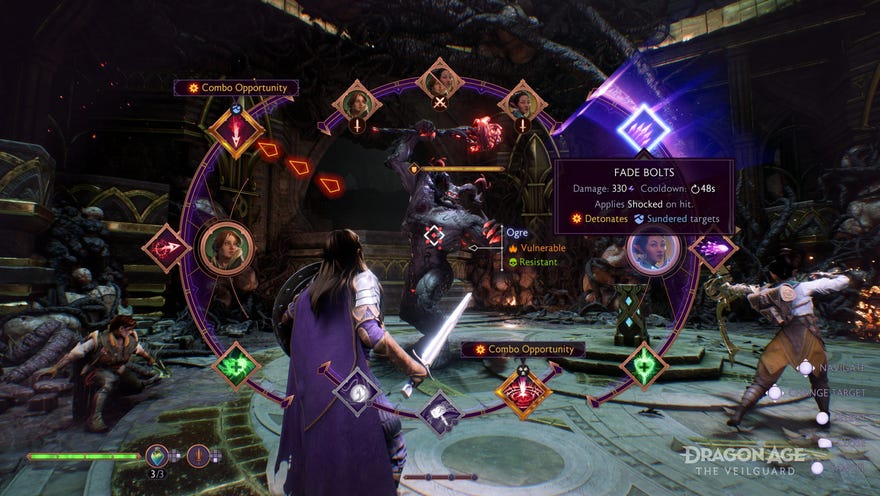HomeNewsDragon Age: The Veilguard
BioWare’s Mark Darrah thinks Veilguard is the first Dragon Age where “the combat’s actually fun"“What I see in Veilguard is a game that finally bridges the gap.”
“What I see in Veilguard is a game that finally bridges the gap.”
Image credit:EA
Image credit:EA

FormerDragon Ageexecutive producer Mark Darrahleft BioWare in 2020, commenting that “I know that Dragon Age won’t just survive without me, it will thrive”. We’ll never quite learn the truth of that claim, for Darrah has now rejoined BioWare to work as a consultant on the recently revealedDragon Age: The Veilguard. He reckons it’s thriving. Specifically, he thinks this is the most enjoyable Dragon Age’s combat has ever been. Shhh, nobody tell the Inquisition.
“What I see in Veilguard is a game that finally bridges the gap,” Darrah told internet-based magazineGame Informerin a new preview that digs a bit deeper into the game’s newly tactical management-lite fisticuffs. “Uncharitably, previous Dragon Age games got to the realm of ‘combat wasn’t too bad.’ In this game, the combat’s actually fun, but it does keep that thread that’s always been there. You have the focus on Rook, on your character, but still have that control and character coming into the combat experience from the other people in your party.”
The piece also includes some commentary from game director Corinne Busche, who notes that Dragon Age’s combat has long been in a state of flux, and justifies the shift towards real-time as making It Feel As Though You’re Actually There. “Every single entry reimagines what combat is like and I would say our goal was to make sure we had a system that allowed players to feel like they actually were able to step into the world of Thedas,” Busche told the site. “They’re not a player observing from afar - they are inside of this world. Being this authentic world that’s brought to life, the combat system needs to support that, so you are in control of every single action, every block, every dodge, every swing of your sword.”
In general, Veilguard’s upgrades are “about changing the way you play, not the statistical minutiae”, Busche explains, with passive abilities including guaranteed critical hits and jump attacks. I would say that Inquisition’s fussier percentages do change the way you play, but Veilguard’s system definitely sounds like it’ll involve less time in menus doing sums. The transition here reminds me of the transition fromDarkest Dungeon1 toDarkest Dungeon 2, which also simplifies the stats into multiples of 12.5, and is none the worse for it.
“[Companions] are their own people,” Busche said of how companions act in the fray. “They have their own behaviors, they have their own autonomy on the battlefield, they’ll pick their own targets. As their plots progress, they’ll learn how to use their abilities more competently, and it really feels like you’re fighting alongside these realized characters in battle.” It’s still important to wield character abilities in tandem, however. Busche gave the example of one character slowing time so that another can fire off a heavy knockdown attack, allowing the player to land a finishing blow. “It is a game about creating this organic sense of teamwork.”
Inmy own first look at Dragon Age: The VeilguardI wrote that “I am definitely in mourning for the less kinetic, more strategic Dragon Age that might have been, but I’m more excited for Veilguard than I thought I’d be after copping the first trailer”. Since then we’ve learned that the game willrestrict you to a couple of companions in battle, in another step away from Inquisition’s party-based tactics. So yeah, still grieving a bit, but I remain hopeful that The Veilguard will prove an entertaining action-RPG if not the Dragon Age fourquel I wanted. The key thing, for me, will be the plot. I don’t mind this being a slicked-back punchfest if there’s a gorgeous dark fantasy melodrama involved. Fingers crossed I’m able to play again before release and get a sense of events beyond the prologue.